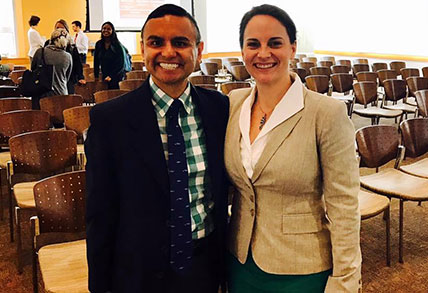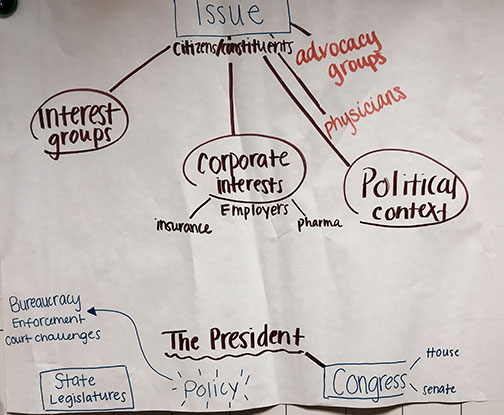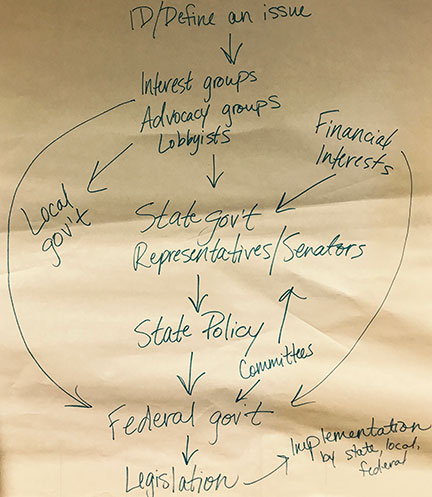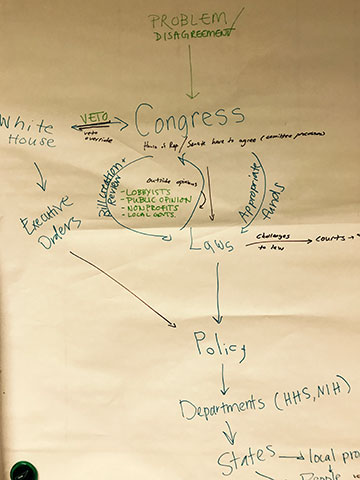Home » News » Reflecting on the First Semester of The Nation’s Health
Reflecting on the First Semester of The Nation’s Health
Posted by anderc8 on Monday, May 8, 2017 in News, The Nation's Health.

Gilbert Gonzales (left) and Tara McKay co-taught the University Course “The Nation’s Health: From Policy to Practice” during the Spring 2017 semester.
Co-Written by Gilbert Gonzales and Tara McKay
During the first offering of our University Course “The Nation’s Health: From Policy to Practice,” undergraduate and graduate students from across Vanderbilt joined us to address some of the major challenges facing the U.S. health care system, including barriers to health care, health care costs and widening health disparities. As the semester comes to a close, we wanted to take a moment to reflect on the successes we enjoyed this semester and explore ways to improve the curriculum for future iterations of the course.
Current Events
One of the things that students seemed to appreciate most about the course was the opportunity to engage with current events. This was, in more than a few ways, very serendipitous as our class began just before Donald Trump was sworn in as the 45th President of the United States. As President Trump and Congressional Republicans worked to repeal and replace President Obama’s health care reform law – known as the Affordable Care Act (ACA) – our class discussed previous attempts at health care reform in the U.S., and the checks and balances our political system has in place to make both reforms and repeals difficult. We also discussed the importance of bureaucracy and the role that Tom Price, the new Secretary of Health and Human Services, will play in future health care reform. We observed ongoing debates in Tennessee about whether to expand Medicaid to low-income Tennesseans, and other debates over the American Health Care Act – the Republican plan to replace the ACA. Throughout it all, students were encouraged to bring news and events to class to digest, and many did so. At the end of the class, students remarked that they felt a bit like “policy ambassadors” who were able to explain current events and policy options to others on campus because they had been given the opportunity to think about these issues in detail and engage in a positive dialogue with their classmates.

Our Visit to the State Capitol
The keystone of the course was a class trip to the Tennessee State Capitol in February. There, we visited with several Tennessee lawmakers and staffers to discuss health care issues affecting the state. This was an eye-opening experiencing for many of our students, who were encouraged to engage their representatives as constituents and as informed experts. Prior to the trip, students researched and developed policy briefs on a particular policy issue under consideration by the Tennessee House or Senate. By engaging with legislators and staffers with evidence in hand, students learned that they could make a real difference in state politics and policy. We often discuss issues and recommendations through a national lens for Washington lawmakers to address, but much of U.S. health policy is made at the state level. For many of our students, the visit to the Capitol cemented state politics as an important and highly consequential arena of health policy. The experience also humanized state legislators, who were receptive to the evidence the students compiled in their policy briefs.

Key Takeaways
On the last day of class, we asked our students to draw the U.S. health policy process in five minutes. Their diagrams – some of which are included in this blog – show the numerous actors and processes involved with American health policy. We also asked the students to summarize key lessons learned throughout the semester. Four major themes emerged. First, national health care reform is an evolving political project and the debate over the ACA is certainly not complete. While some lawmakers want a total repeal, others want to fix and improve the ACA. Second, not all policy solutions are possible everywhere at all times as some states want flexibility in choosing their policies. Third, health policy affects real people, sometimes in unexpected or unintended ways. Many ongoing debates have direct and indirect effects on vulnerable populations, including low-income families, racial and ethnic minorities and the LGBT community.  Finally, advocating for change takes passion, presence and persuasion. Some of our guest lecturers reiterated the importance of pursuing your passions while standing for your beliefs. Students also recognized that the policy process can at times be very frustrating and requires perseverance as other interests compete with those of constituents.
Finally, advocating for change takes passion, presence and persuasion. Some of our guest lecturers reiterated the importance of pursuing your passions while standing for your beliefs. Students also recognized that the policy process can at times be very frustrating and requires perseverance as other interests compete with those of constituents.
We look forward to teaching this course again next spring. We plan to build on the successes of this semester’s class by inviting speakers who represent different interests, including health care industry experts and individuals representing organizations with different political perspectives.
